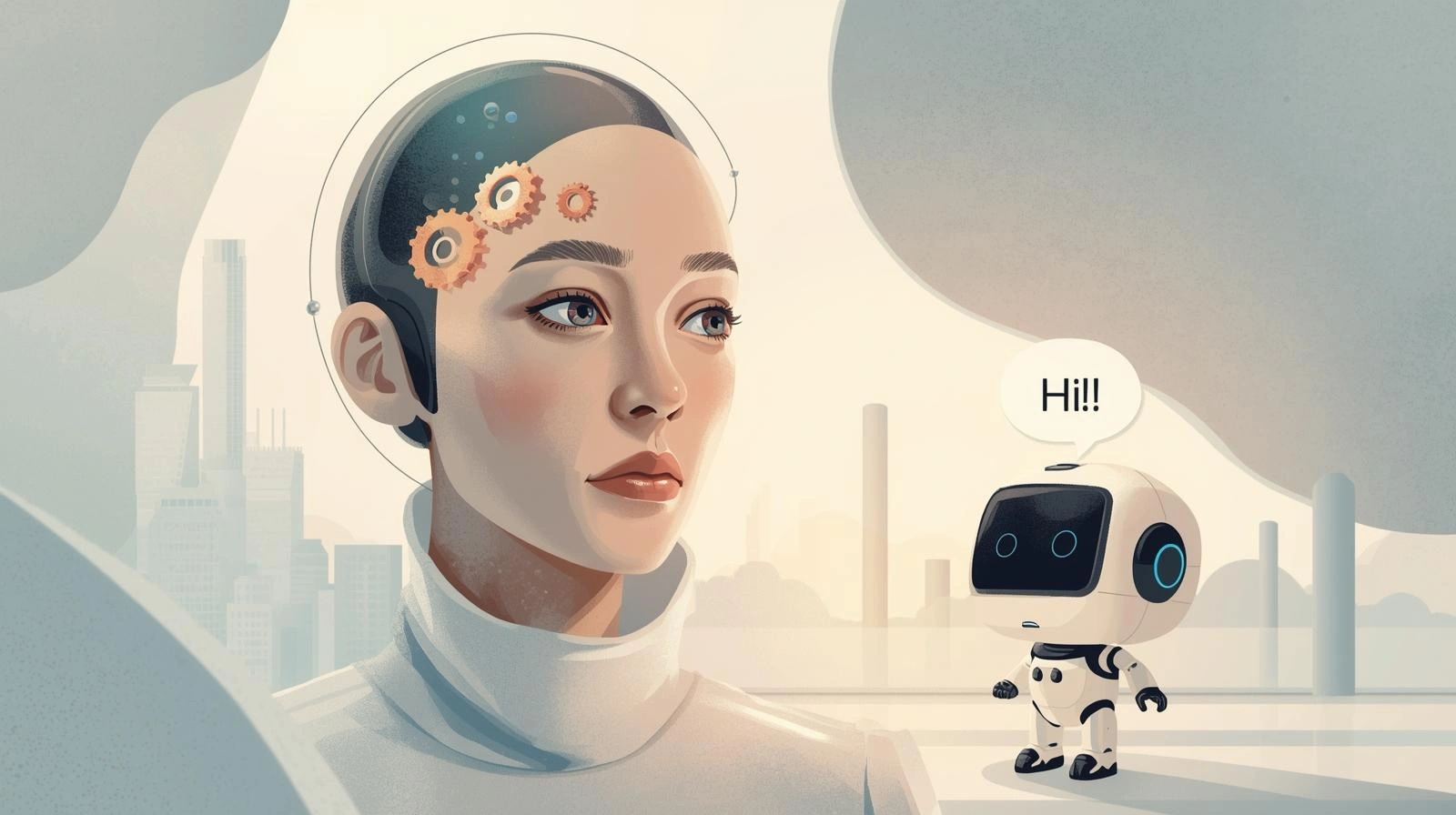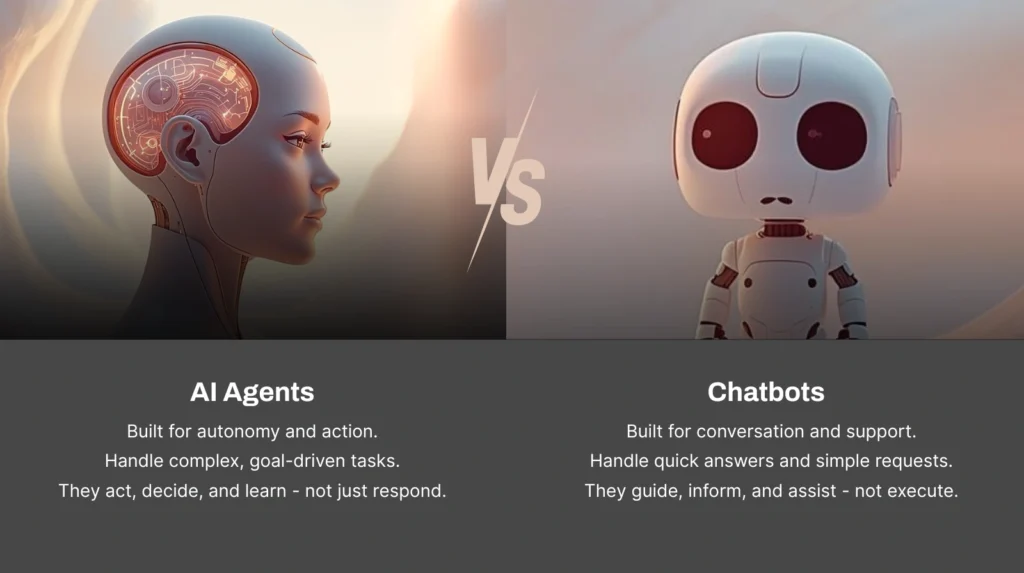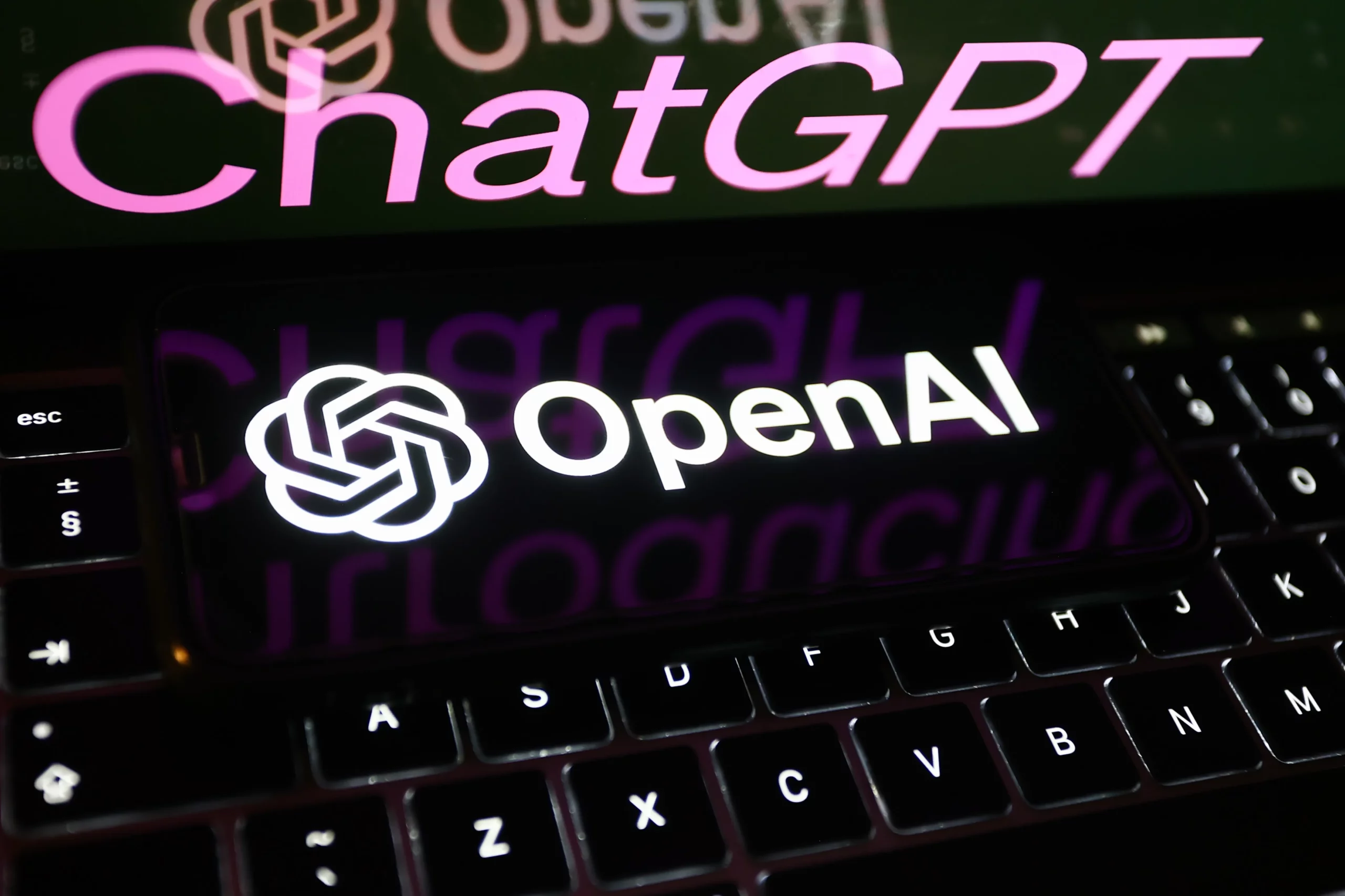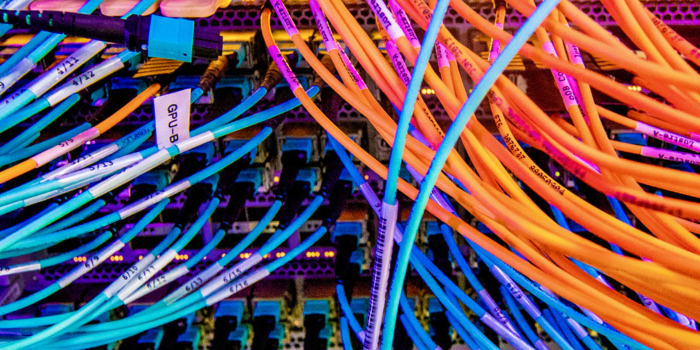AI AGENTS
Chatbots
AI Agent vs Chatbot: What’s the Difference and Which Does Your Business Need?

Do you want more efficient workflows, better insights, and less manual work? Of course you do. And so does every business.
Research shows that 78% of respondents say that their companies use AI for at least one of their business functions. But not all AI solutions are created equal.
More importantly, you need to know which one works best for your organization. Do you need an AI agent? Are chatbots a better solution? How are they different?
That’s what we are here to find out. Keep on reading as we explain the real difference between AI agents and chatbots, how you can make the most of each, as well as decide when one or the other is the smarter choice.
Chatbots Explained
A chatbot is a software application powered by AI and designed to emulate human conversations and interactions, mainly through text or voice. It can answer user questions, take orders, and or provide them with the information they need.
Chatbots rely on natural language processing (NLP), rule-based logic, decision trees, scripts, and limited data sets to interpret user input and deliver predefined answers.
What they lack when it comes to contextual reasoning or autonomy, they make up for in speed and control. Chatbots are ideally suited for predictable and repetitive tasks, such as answering FAQs, providing customer support, collecting information, or giving directions.
You can think of them as virtual vending machines: they only provide what’s part of their fixed inventory.
AI Agents Explained
An AI agent is an artificial intelligence system that can make decisions, understand context, and complete tasks and goals autonomously, with little to no human input.
To achieve this, AI agents rely on the foundation provided by LLMs and a number of other machine learning techniques. They have the ability to process information, adapt to changing circumstances, and use reasoning to find their way through problems.
Whereas chatbots operate within fixed parameters, AI agents are capable of handling complex, multi-step tasks and workflows, integrating with your existing tech stack and tools, and improving with each new interaction.
An AI agent is like a skilled line cook: able to follow custom orders, adapt to changing ingredients, and prepare meals without constant supervision from the head chef.
AI Agent vs Chatbot: Differences (and Similarities) Explained
The reason why AI agents and chatbots get mixed up is that they both use artificial intelligence, understand human language, and help with tasks.
The main difference is in the way they go about it, as well as the complexity of tasks they can handle.
To help you understand these and know which one is the right solution for your particular case, let’s go over the AI agent vs chatbot differences in the table below:
| Category | Chatbots | AI Agents |
| Understanding User Intent | Follow rules and keywords. | Use nuance NLP and LLMs to understand intent and context. |
| Response Quality | Scripted or fixed replies for routine questions. | Context-aware responses that adjust to evolving inputs. |
| Learning | Manual updates and retraining to improve performance. | Learning from data and user interactions through ML and feedback loops. |
Autonomy | Reactive – respond only when prompted. | Proactive – capable of making autonomous decisions and taking action. |
Context Awareness and Memory | Short-term or session-based memory; limited awareness of prior interactions. | Long-term memory and contextual understanding across sessions and users. |
Personalization | Basic personalization (e.g., using names or basic preferences). | Deep personalization using behavioral data, conversation history, and real-time inputs. |
Integration | Limited integrations, such as a single channel or CRM. | Integrate with multiple tools and systems (CRMs, ERPs, APIs) |
| Implementation and Maintenance | Extensive setup, conversation mapping, and ongoing manual tuning. | Faster deployment due to generative capabilities and adaptive learning post-launch. |
| Cost | Lower initial investment. | Higher upfront cost. |
| Scope | Fixed domain or knowledge base (FAQs, help docs). | Multiple knowledge sources, APIs, and live data streams. |
| Best For | Simple, low-risk interactions like FAQs, support triage, or onboarding. | Complex workflows where adaptability, reasoning, and automation are key. |
Curious how AI agents compare to AI assistants? Learn more about key differences between AI agents and AI assistants here!
Similarities Between AI Agents and Chatbots
There are some pretty smart chatbots out there, as well as AI agents that are conversational, which blurs the line between the two.
Complicating the matter even further is the fact that they share foundational traits, as well as some of the goals. Here is where chatbots and AI agents overlap:
- Same technology: Both chatbots and AI agents can run on the same LLMs, such as GPT.
- Automation: Each can perform time-consuming, repetitive manual tasks. The only difference is in the complexity of those tasks.
- 24/7 operation: They are available and responsive around the clock, handling tasks like customer support or complex decision-making.
- Business impact: AI agents and chatbots are keeping customers happy and operations running smoothly across industries.
Real-World Example of a Chatbot
If you have used ChatGPT’s interface or Duolingo, then you’ve already interacted with a chatbot. Another real-life example is of a chatbot is SmartCat’s Company Mind Assistant (CMA).
CMA is a smart chatbot built on large language models (LLMs) and retrieval-augmented generation (RAG), capable of searching your internal documentation, policies, data, and resources and providing immediate, accurate, and contextually aware answers.
It saves our departments hours every week, as it now takes team members 50x less time to find answers. Also, CMA made our marketing and sales processes 40% more efficient. More importantly, it turned scattered information into instantly available insights.
Check out this quick video of how Company Mind Assistant actually works:
Real-World Example of an AI Agent
AI agents are not just a future concept. They are being used as we speak across tasks, organizations, and industries. Tesla uses AI agents not just to power the autopilot of their cars, but also to assist with their assembly.
Here at SmartCat, our Labs team built and deployed AI agents to help our internal department automate the following:
- Employee leave management: Our HR team now uses a team of four AI agents to approve time-off requests in minutes.
- Data collection and reporting: We provided our marketing and sales teams with an AI agent that scrapes data from social media and newsletters, and delivers a tailored, concise market digest into their Slack and Google Docs.
- AI lead scoring: Our sales team now uses an AI agent to analyze and score each lead by industry, size, product relevance, and cultural fit in seconds instead of hours.
- LLM expense analyzer: AI agent-powered system automatically extracts, categorizes, and reports company expenses, giving our finance team instant insights and saving hours of manual work.
Choosing Between an AI Agent and a Chatbot: When To Pick Which One

On the face of it, AI agents seem like the obvious choice due to their autonomy, reasoning, and ability to adapt. However, that doesn’t necessarily make it the right fit for every use case or organization.
There are still plenty of scenarios where a smart chatbot can be a more practical solution.
Picking either one is going to depend heavily on your goals, as well as a number of other factors, including:
Complexity of Tasks and Workflows
Start by gauging the complexity of your use case. If you need an AI solution to manage daily interactions that are very predictable in nature, then chatbots are your option. Think stuff like automated customer support, FAQs, or guiding users through forms.
If your workflows involve multiple steps, require reasoning, or tasks that rely on several data sources, AI agents are a stronger choice, especially for things like data analysis and reporting, context understanding, as well as sequences that require autonomous action and decision-making in real time.
Budget
If you are looking for a more affordable way to automate some of your work through AI, chatbots are what you’re looking for. They are cheaper to build, integrate, and maintain, and they require minimal infrastructure.
AI agents are more suitable for organizations that can afford to make a larger initial investment to cover the cost of advanced integration, continuous learning, as well as computational resources. However, they make up for that through reduced operational costs.
Growth
In terms of scaling, chatbots can handle large volumes of simple tasks without a hiccup, but they can only handle new applications if they are updated on a regular basis.
AI agents can do both here. They excel in applications where adaptability is required, plus they scale even better than chatbots. This makes them perfect for growing companies, as well as those with increasingly complex processes.
FAQs about AI Agent vs Chatbot
In this section, you can find answers to the most commonly asked questions on the AI agent vs chatbot discussion:
Is ChatGPT an AI agent?
Not exactly. ChatGPT is an AI chatbot, not a full AI agent. It can understand and generate human-like text, but it’s reactive, meaning it requires user input. It doesn’t independently take actions or make decisions.
AI agents, on the other hand, use reasoning, memory, and integration to act autonomously and complete tasks beyond conversation.
Will AI agents replace chatbots?
No, AI agents won’t replace chatbots completely, at least for the time being. There are plenty of businesses that use both to complement each other.
Chabots handle simple and quick interactions, while AI agents manage complex, multi-step workflows. Businesses end up benefiting from both speed and autonomy.
Are AI agents just chatbots?
No. While both use artificial intelligence and natural language processing, AI agents’ abilities go beyond chat.
They can reason, plan, and execute actions across systems, while chatbots mainly answer questions or guide users through fixed conversation flows.
Can a chatbot become an AI agent?
Yes, a chatbot can evolve into an AI agent if upgraded to include long-term memory, contextual reasoning, and integrations.
Once a chatbot is given access to tools, APIs, and multiple data sources, it can begin to act autonomously, reason, and make decisions, rather than just giving answers to queries.
Do AI agents and chatbots work together?
Absolutely, there are many organizations that use a chatbot to handle the front end and collect user input, and an AI agent to perform complex actions, process data, and provide intelligent results on the back end.
When put together, chatbots and AI agents make for an efficient automation ecosystem. So, in practice, the AI agent vs chatbot head-to-head usually turns into a collaboration of AI agents and chatbots.
Conclusion – Grow Your Organization with SmartCat Chatbots and AI Agents
Ultimately, deciding if an AI agent or a chatbot is a solution to your problem depends on what you need them to do, your specific use case.
If your team or department needs quick answers and instant access to company knowledge, a chatbot will get the job done. But, if you need something to automate complex workflows, go through lots of data, and make decisions on its own, an AI agent is your next step.
And you will also find that most scenarios will require you to use both together.
At Smartcat, we build both. Company Mind Assistant (CMA) enables your teams to gain instant access to your company’s knowledge and save time in the process, and our custom chatbots can streamline any kind of repetitive task.
Our custom-built AI agents can provide your HR, sales, marketing, or finance teams with workflow automation, autonomy, decision-making, and data-powered insights in no time.
Want to see where intelligent automation can make the biggest impact for your business? Check out SmartCat’s Company Mind Assistant, AI agent solutions, or book a strategy call today with our experts!





